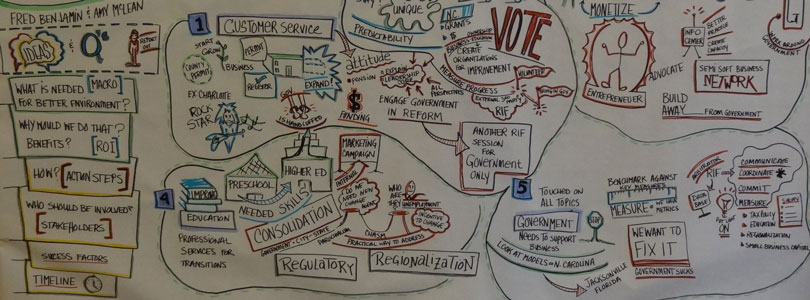Mike Stenhouse: Can “Make It Happen” Make It Happen Without Public Policy Reform?
As a participant in the two-day “Make It Happen RI” event sponsored by the Rhode Island Foundation at the Convention Center last weekend, which was attended by over 300 local business and education leaders, I’d say that the event was first class, start to finish, and the Foundation and its staff must be highly commended. I’d also suggest that a number of viewpoints became evident, multiple questions remain, one major perspective was avoided, and there were clearly a few winners and many losers that emerged.
The main premise of the event was for the group, via smaller breakouts and even smaller tables, to produce ideas on what the private sector could do to stimulate employment and economic growth, and that the RI Foundation would then take the best of these ideas to state leaders.
The Foundation deserves a chance to make sense of the many, colorful storyboards that documented the group’s numerous ideas. However, it seems to me that purposely ignoring the impact of potential public policy reform may have been a flaw in the event’s design.
It was immediately obvious that the small business community, which was most heavily represented among the participants, was eager to have this forum to share their ideas. Among my observations:
- With obvious pent-up frustration about the state’s failed business climate, the group was enthusiastic to voice its deep-felt concerns and hopes for our state.
- There was much talk about why the business sector has not been a more potent force, with general agreement that people can and must pool their voices.
- Similarly, there was a strong dissatisfaction that no strong advocate for their interests exists.
- Some of the worst ideas I heard were to create publicly funded partnerships with private associations or higher-ed institutions to conduct more research.
- There was a general call for predictability about public policy, but specific reform ideas were not actively sought.
- Literally hundreds of ideas were generated, many novel and creative, but most assumed jobs were available — that training, informational sharing, marketing, and a better aligned education system would help job seekers find jobs … but how many of those jobs exist?
Herein lies the main question many of us expressed. How can we grow our economy and create jobs, without addressing the third rail, the two 800-pound gorillas in room: legislative barriers to success and the influence of employee unions? While politicians were not invited to participate, union officials were prominent in their presence.
The question of “what can the private sector do,” without reforming the government-established business climate, in my opinion, is largely irrelevant. It’s like worrying about what sneakers to wear in a race, instead of being concerned about how to get the big monkeys off your back.
This leads to some interesting questions about what “Make It Happen” can actually make happen:
- Can the RI Foundation effectively boil the hundreds of ideas presented down to a cogent action plan? If so, most of the ideas were private sector initiatives, so to whom do they present the ideas?
- Will the promises generated at many tables — “yes, let’s get together and follow up on that idea” — effectively happen?
- Can small business leaders put aside their political differences to come together with a unified voice that truly represents the best interests of the private sector? If so, who or what will be that voice?
- Will the perceived fear of “retribution,” expressed privately by many, dissuade potential leaders from stepping forward and actually leading?
There were winners: the RI Foundation for exhibiting leadership in bringing so many business people together in a high-profile, well-run event, and the business community itself for potentially finding its footing and a collective voice.
But there were obvious losers, as well: the EDC for failing to foster a positive climate of economic development, the Chambers of Commerce for not already being that voice of small business, our educational system for not aligning its curriculum to produce graduates with skills required by businesses, and past/current legislatures and administrations for putting up too many barriers that the private sector must overcome.
The private sector — entrepreneurs, innovators, and job creators — know how to succeed, especially if they know what the ground rules will be. Of course, it’s productive to share ideas on working more effectively together, but what “Make It Happen” did not seek were ideas on how state government could get out of the way so economic growth could happen.
As CEO of a public policy think tank, I believe these ideas should have been more aggressively sought. Combined with private sector initiatives, collecting and reporting public policy reform ideas would have made this event an unquestionable success.
Hopefully, “Make It Happen 2.0” will add the legislative perspective.
Mike Stenhouse is CEO for the non-partisan RI Center for Freedom & Prosperity, parent organization of the Ocean State Current.



